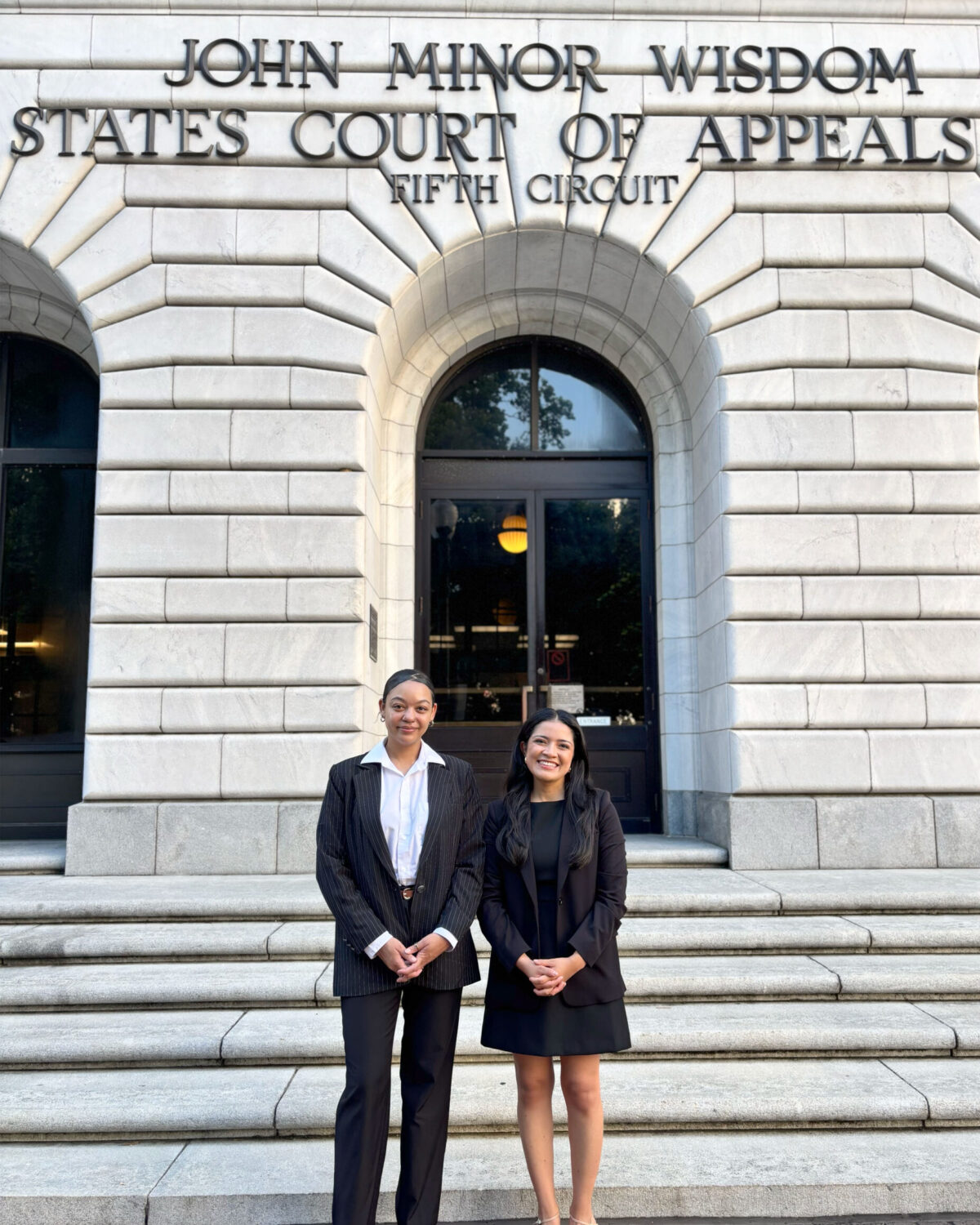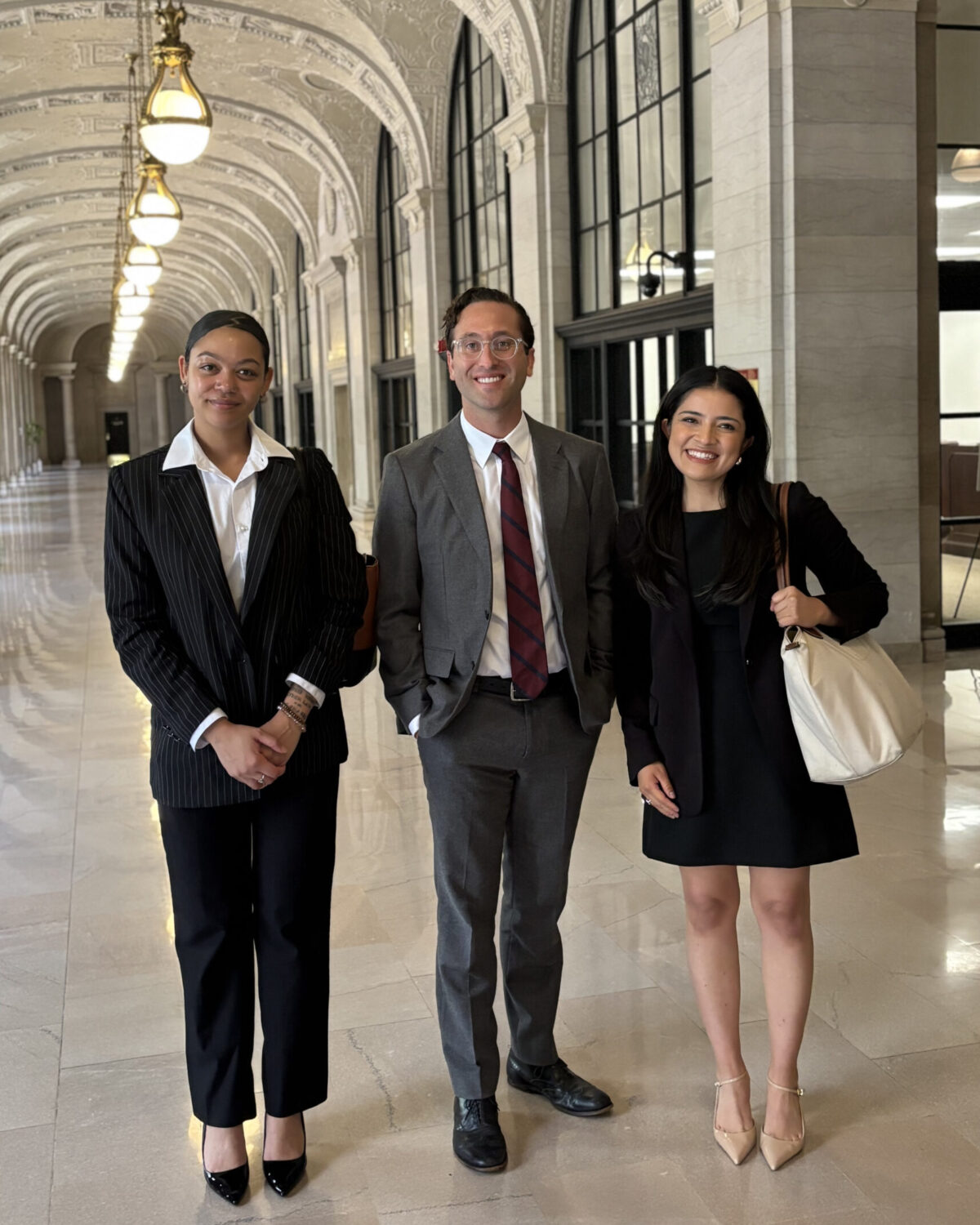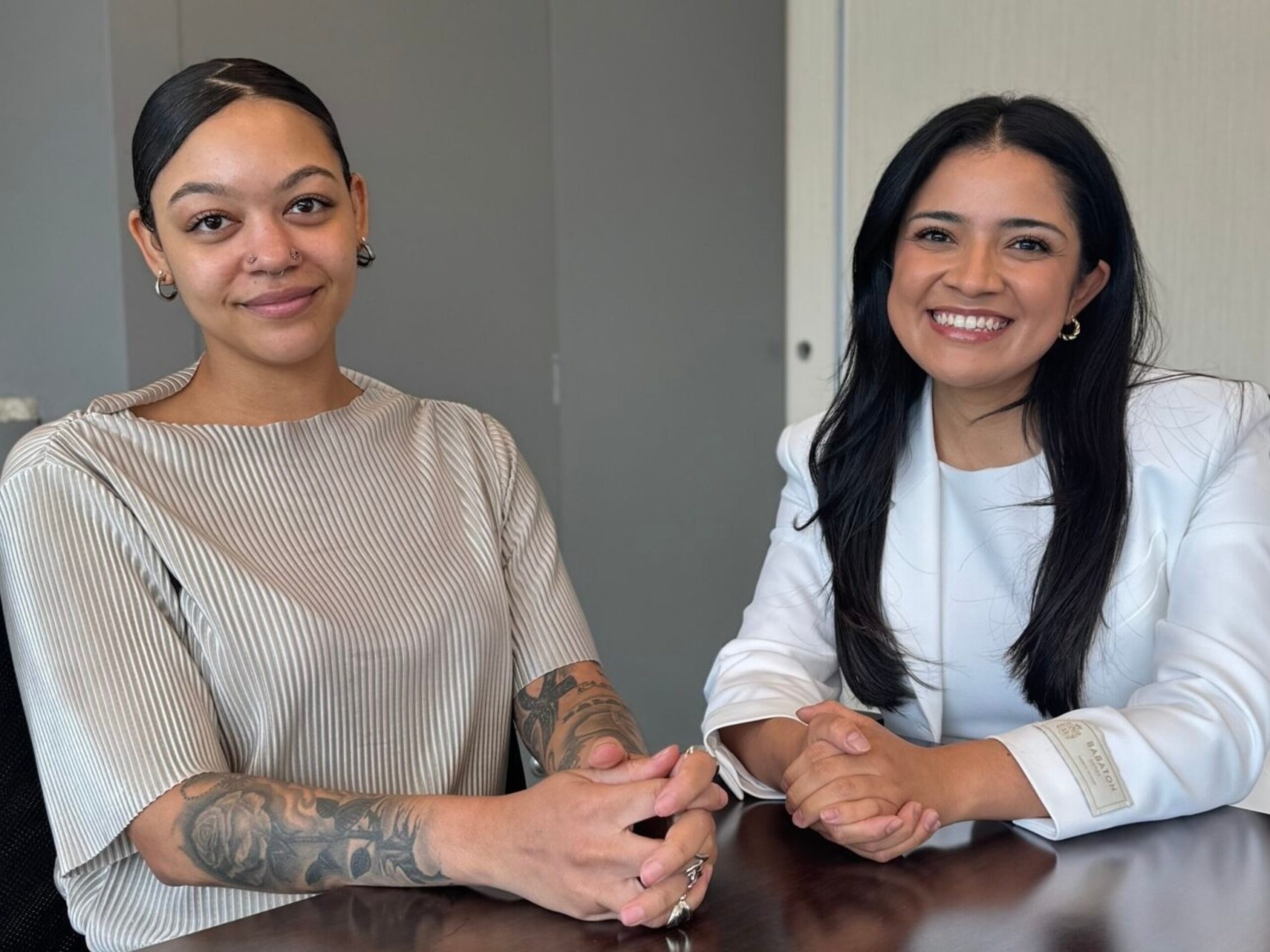
In 2024, as summer associates in the Austin office of Kirkland & Ellis, Gabrielle Olubanke Howells ’25 and Lizeth Badillo Garcia ’25 traveled to the John Minor Wisdom U.S. Court of Appeals Building in New Orleans to observe the firm’s oral argument in a case before the 5th Circuit.
“It was an incredible experience, and I was on cloud nine,” says Howells. As she watched the advocates make their arguments, she found herself thinking, “‘I can’t wait to do this.’”
Badillo Garcia was similarly awed by the experience, and also by the stately surroundings of the federal appeals court. “I love that courthouse,” she notes. “It’s beautiful. It looks palatial.”
Less than a year later—and just three weeks after their Texas Law graduation—Howells and Badillo Garcia were back in that palatial court, this time as advocates themselves, arguing on behalf of an elderly incarcerated man alleging inadequate medical care in prison.
It was June 5, 2025, and a predictably hot and humid day in New Orleans. Kirkland & Ellis litigation partner Zack Ewing had spent months supervising the preparations for the hearing. He offered a brief introduction. Howells, who had been selected to speak first, then approached the podium, set down her binder, opened it to the first page, and leaned to the microphone.
“Good morning, your honors,” she began. “And may it please the court…”
A Novel Opportunity
The path that took Howells and Badillo Garcia from wide-eyed gallery observers to first chair attorneys started in earnest shortly after that summer 2024 field trip.
Howells and Badillo Garcia were having their 2024 mid-summer reviews with Ewing, and each mentioned how much they enjoyed seeing the appellate arguments in the 5th Circuit. That resonated strongly with Ewing. Thanks to the pro bono program at the University of Pennsylvania, where he’d attended law school, Ewing had been able to argue before the U.S. Court of Appeals for the 3rd Circuit as a student.
Ewing had an idea. Could Kirkland & Ellis, with Texas Law’s support and the participation of the school’s Richard & Ginni Mithoff Pro Bono Program, reach out to the 5th Circuit’s Pro Bono Office and see if a case could be found with an appellant in need of representation? And, if so, could Howells and Badillo Garcia be given dispensation by the court to make the oral arguments if the case proceeded that far?
Texas Law enthusiastically agreed. “The Law School celebrated and supported this initiative from day one,” Ewing says.
While the 5th Circuit does not have a formal rule about court appearances by law students, Ewing was able to persuade the court to allow it. By the end of the summer, the court had assigned Ewing as pro bono counsel for plaintiff Stephon Eric James and agreed to allow Howells and Badillo Garcia to appear in the case under Ewing’s supervision.
Thus began eight months of intense effort by the students, the support of many Texas Law faculty, and committed coaching from Kirkland & Ellis attorneys.
“This is the first time the Law School has worked with a law firm in this way to facilitate student arguments in a federal appeals court,” says Eden Harrington, the school’s associate dean for experiential education. “We are very grateful to Zack and Kirkland & Ellis for creating this opportunity for our students, and I’m optimistic that this could set the stage for similar experiences in the future.”

Prepared for Anything
With the court and school on board, the first task for Howells and Badillo Garcia: learn every detail of James’ case.
In September 2022, the elderly Louisiana prisoner had sued doctors and prison officials in the lower court under a federal civil rights law allowing individuals to sue government officials for alleged violations of constitutional rights. James claimed that the defendants failed to provide medical treatment required for his prosthetic eye and covered up the alleged failure. According to briefs filed with the appeals court, James had requested and been denied an attorney in the lower court.
James appealed and filed an appellate brief on his own behalf. Once the Texas Law students were on the case, they filed a supplemental brief. For their brief and oral argument, Badillo Garcia and Howells mastered a complicated record, with medical facts and a procedural history including handwritten pleadings prepared by James representing himself at the district court level.
Howells and Badillo Garcia split their labors on the brief and oral argument, with Howells handling the claims against James’ doctors and Badillo Garcia addressing claims against prison officials. They not only had to get caught up on the lengthy factual record, but they also had to analyze the legal framework and how it applied to the case. “The record was voluminous,” says Badillo Garcia. “Recognizing issues that are strong for appeal and how we’re going to argue the law, it’s been a great mental exercise.”
As the then-students prepared to file the supplemental brief in November 2024, they also were balancing full courseloads, clinical work, and journal roles, with Howells serving as an associate editor of the Texas Law Review and Badillo Garcia as the editor-in-chief of The Review of Litigation. Along with their school work and activities, they also became intimately familiar with the deadline pressures and rigorous internal writing and review process involved in a federal appeal.
“I like a challenge,” says Badillo Garcia. “It was a lot of work, but very gratifying and rewarding.”
Badillo Garcia also had previously participated in Texas Law’s Supreme Court Litigation Clinic, directed by Professors Erin Busby and Lisa Eskow. The clinic often helps to moot attorneys in preparation for Supreme Court appearances, simulating oral arguments, with the professors from the clinic and additional Texas Law faculty serving as judges. “We ask the toughest questions possible based on familiarity with the way the Court decides cases,” says Eskow. “And clinic students are able to pose a round of questions, as well.”
In addition to helping advocates develop and sharpen their strategy, a moot gives seasoned and new advocates alike the chance to experience the rapid-fire nature of an actual argument, in which the judges may pose questions on any aspect of the case at any moment, without warning.
Badillo Garcia had participated in several such moots and had traveled to Washington, D.C., with the clinic to watch an oral argument in one of those cases. As the James case neared its oral argument, she asked Busby and Eskow to moot her and Howells.
Busby says she and Eskow each provided an objective outsider’s perspective and gave Howells and Badillo Garcia a sense of what the argument would be like.
“And we certainly didn’t go easy on them,” notes Busby. “We pushed them on every aspect of the case.”
The approach was appreciated. “I truly felt like I was prepared for anything that the court would throw our way, thanks to the professors,” Howells says.
Busby and Eskow also proved to be prescient. Less than a minute into her actual presentation, Howells was interrupted with the first question from Chief Judge Jennifer Walker Elrod.
Howells didn’t mind. “I felt the nerves all the way up until I was interrupted by the chief judge. After that, it started feeling super conversational for me,” she recalls. In the end, opposing counsel went out of their way to compliment Howells and Badillo Garcia on their performance.
The experience was remarkable for the new graduates, but it was priceless for James.
“Someone who has been asking for lawyers all along and did not get them in the trial court now gets first-class representation from two very talented recent Texas Law graduates, under the supervision of a very experienced and excellent Kirkland litigation attorney,” says Eskow. “That’s an outcome that furthers justice and serves this client.”
As for Ewing, the outcome to date is everything he initially hoped Howells and Badillo Garcia would experience, and more.
“Within one month of graduating, their first real, substantive experience is standing five feet away from three circuit judges and handling a litany of rigorous questions about the case,” Ewing says. “And they just performed phenomenally.”
“They showed up and did something tremendously difficult.”
‘Why I Came to Law School’
The team doesn’t expect a decision for at least a few months after argument. Badillo Garcia says she hopes the court will reverse and remand, or at least give James a chance to file an amended complaint, this time with attorney representation.

For now, Howells and Badillo Garcia have turned their efforts to the more common post-graduation activity: bar prep. After taking the exam later this month, each will start their career in litigation practice with Kirkland & Ellis. Howells will be in the Houston office and Badillo Garcia will remain in Austin.
For the time accumulated working on James’ case, the Mithoff Program awarded Howells and Badillo Garcia with its Pro Bono Beacon Award, given each year to the students with the highest number of pro bono hours in their class. Texas Law encourages students to complete at least 50 hours of pro bono services over the course of their law school years. Howells performed more than 300 hours, while Badillo Garcia completed over 500 hours (she also earned a Pro Bono Beacon Award her 2L year).
The Mithoff Program frequently works with bar groups, legal services organizations, and pro bono attorneys to connect students with opportunities to build skills and increase access to justice. Often, the pro bono work available to law students can be limited due to factors like time constraints and the availability of attorney supervision. In this matter, however, Howells and Badillo Garcia learned about legal issues they hadn’t previously encountered and how to brief and argue an appeal, all under several months of supervision by an attorney. “This is an exciting new model that we haven’t tried before, and the students had an amazing experience and learning opportunities,” says Andrea Marsh, the program’s director.
Mike Golden ’01, the director of Texas Law’s advocacy program and a successful trial attorney, is another fan of Howells and Badillo Garcia’s accomplishment.
“So many amazing, successful attorneys in Texas go their whole careers without a chance to argue before the 5th Circuit.” Says Golden. “Gabrielle and Lizeth have real bragging rights. They’ve done something extraordinary and I could not be more proud of them, or thrilled for them.”
Howells and Badillo Garcia understand that this case is an impressive résumé item and a valuable experience in litigation and civil rights law to take into their careers. It’s also been personally fulfilling.
“These issues are near and dear to my heart,” Howells says of trying to vindicate James’ rights. “I’m giving him a voice, and at the end of the day, that’s really all that I can ask for in this life,” she says. “That’s why I went to law school.”
